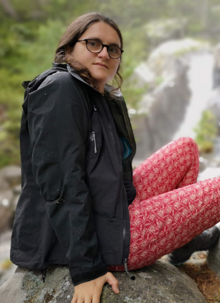Suzanne Aigrain
Suzanne Aigrain | |
|---|---|
 Suzanne Aigrain in 2018 | |
| Born | January 9, 1979[1] |
| Education | Lycée Pierre-de-Fermat |
| Alma mater | Imperial College London (BSc) University of Cambridge (PhD) |
| Scientific career | |
| Fields | Astrophysics Astronomy Exoplanets Bayesian inference |
| Institutions | University of Oxford University of Exeter University of Cambridge |
| Thesis | Planetary transits and stellar variability (2005) |
| Website | www |
Suzanne Aigrain (born 1979)[1] is a Professor of Astrophysics at the University of Oxford and a Fellow of All Souls College, Oxford.[2] She studies exoplanets and stellar variability.[3]
Early life and education
Aigrain grew up in
Career and research
Aigrain was a
She has expressed her concerns about the detection of planets using the radial velocity method to detect exoplanets; such as instrumental precision, stellar activity, patchy observations and limitations of other models.[12] She was part of the European Southern Observatory (ESO) discovery of the Earth sized planet close to Alpha Centauri Bb,[13] but played an even closer role in the study that disproved the planet's existence in 2016.[14]
Aigrain and her group use
In 2019 Algrain was awarded a European Research Council Consolidator Grant to study exoplanets.[19]
Aigrain is interested in public engagement and regularly delivers popular science lectures.[10][20][21][22] She spoke about exoplanets on In Our Time in 2013.,[23] and has taken part in Pint of Science.[24] In 2018 she spoke at the Oxford Playhouse, accompanying the play One Small Step.[25] In November 2018 she was part of the Kings Place Bach, the Universe and Everything performance.[26] She is a member of the International Astronomical Union.[27] She writes non-fiction with Philippe Aigrain, as well as writing her own poetry.[28][29][30]
References
- ^ a b c Aigrain, Suzanne (2007). "Suzanne Aigrain CV" (PDF). Ex.ac.uk. Archived from the original (PDF) on 2015-08-07.
- ^ a b c d e f "All Souls College Oxford". Asc.ox.ac.uk. Retrieved 2018-11-25.
- ^ "Suzanne Aigrain - University of Oxford Department of Physics". 2.physics.ox.ac.uk. Retrieved 27 November 2018.
- ^ "Suzanne AIGRAIN - Innovation Convention 2014". Ec.europa.eu. Retrieved 2018-11-25.
- ^ EThOS uk.bl.ethos.614684.
- ^ "Dr Suzanne Aigrain". Newton.ex.ac.uk. Retrieved 2018-11-25.
- ^ "Past group photos | Physics and Astronomy | University of Exeter". Emps.exeter.ac.uk. Retrieved 2018-11-25.
- ^ "Suzanne Aigrain: homepage". Astro.ex.ac.uk. Retrieved 2018-11-25.
- ^ "about – stars & planets @ oxford". Splox.net. Retrieved 2018-11-25.
- ^ a b "Interview: Suzanne Aigrain | SpaceCareers.uk". SpaceCareers.uk. Retrieved 2018-11-25.
- ^ "A golden age of exoplanet discovery". Spacedaily.com. Retrieved 2018-11-25.
- ^ "Interview with Suzanne Aigrain : On the Search for nearby Earth-like Exoplanets". PALE RED DOT (in French). 2016-02-14. Retrieved 2018-11-25.
- United Kingdom Research and Innovation. Retrieved 2018-11-25.
- S2CID 119294717.
- S2CID 119206652.
- PMID 24664910.
- S2CID 15479773.
- ^ "GTR". gtr.ukri.org. Archived from the original on 27 November 2018. Retrieved 17 January 2022.
- ^ "ERC awards over €600 million to Europe's top researchers". ERC: European Research Council. 2019-12-05. Retrieved 2019-12-11.
- ^ Anon. "Exploring the Diversity of Exoplanets". Iop.org. Retrieved 2018-11-25.
- ^ "Exploring the Diversity of Exoplanets" (PDF). Rse.org.uk. Retrieved 2018-11-25.
- ^ Follow The Evidence (2017-07-03), Where and How Might We Search for Life? - Suzanne Aigrain, retrieved 2018-11-25
- ^ "BBC Radio 4 - In Our Time, Exoplanets". Bbc.co.uk. BBC. Retrieved 2018-11-25.
- ^ "Deep space discoveries". Pintofscience.co.uk. Retrieved 2018-11-25.
- ^ "One Small Step: Far Beyond The Moon". Oxfordplayhouse.com. Retrieved 2018-11-25.
- ^ "Orchestra of the Age of Enlightenment – Worlds Beyond • Kings Place". Kings Place. Retrieved 2018-11-25.
- ^ "Suzanne Aigrain at IAU". Iau.org. International Astronomical Union. Retrieved 2018-11-25.
- ISBN 9789089643858.
- ^ "About | www.sharing-thebook.com". Sharing-thebook.com. Retrieved 2018-11-25.
- ^ "Suzanne Aigrain: Poetry". Astro.ex.ac.uk. Retrieved 2018-11-25.
